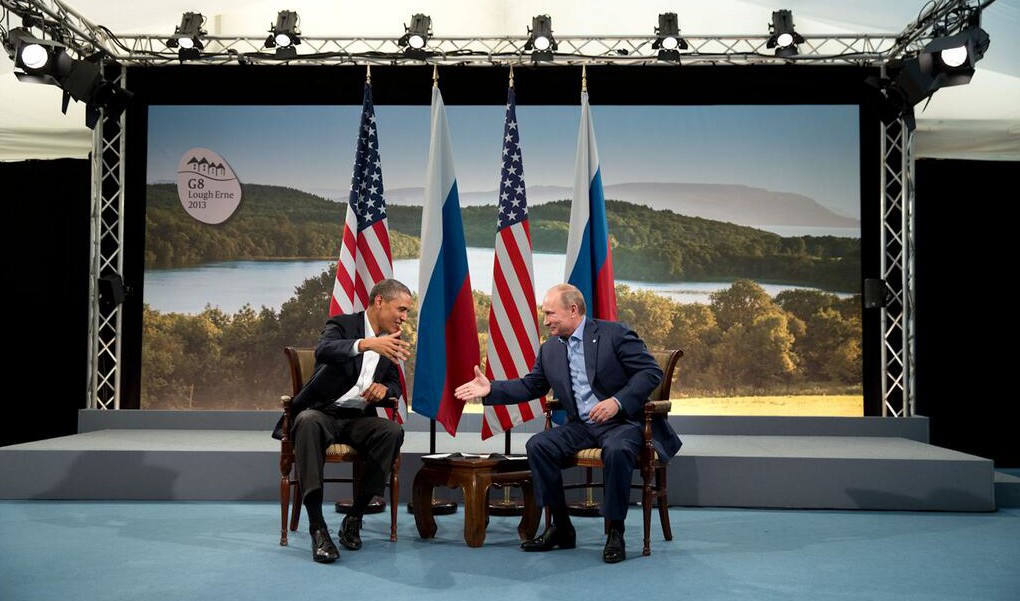Often discussed during the past month’s Syrian chemical weapons debate has been the present and altogether fractured state of U.S.-Russian relations. In the cold, marbled walls of embassies, state departments, and, of course, the U.N., this conversation has lingered on. Comparisons, however misapplied, have even been drawn to that other crisis that took place in Cuba 51 years ago this October. The two old diplomatic foes and Security Council members again stand pitted against each other in icy appraisal, which is why it was so fascinating to read an op-ed “from the other side” in the New York Times on Wednesday. Penned by Vladimir Putin, it is an impassioned defense of Russia’s stance on Syria – and a just as impassioned critique of President Obama, Secretary Kerry and co., who have been plugging for weeks for a military strike. Those over at the FT might have given Putin’s words a mostly unfair and comedic line-by-line analysis, but I do think several of the ideas can be examined in the context of the Obama administration’s response to the Syria crisis.
In defending Russia’s opposition to a strike in Syria, Putin writes, “We are not protecting the Syrian government, but international law. We need to use the United Nations Security Council and believe that preserving law and order in today’s complex and turbulent world is one of the few ways to keep international relations from sliding into chaos.” Putin is right about the need to utilize the Security Council, but he is at least partially wrong in arguing that “law and order” in the world of international laws, norms, and rules hasn’t yet “slid into chaos.” This has, in many ways, already happened. Those who remember the days of exorbitant executive privilege in George W. Bush’s administration might have applauded President Obama’s decision to effectively pass the decision on whether to strike Syria or not on to Congress. I know this was my first, instinctual reaction.
But this is not 2003, no president is the same, and no situation is alike. There is a strong argument that can and should be made that kicking the Syria decision to a divided Congress the president has long derided has made Obama and the United States appear entirely weak and ineffectual, and has contributed nothing to the global discussion surrounding Bashar al-Assad, Syria, and chemical weapons. Of course, a strike ordered solely by executive action would have had a similar effect, as Mr. Putin argues. What was necessary was strong diplomatic action on behalf of the executive branch and the State Department. Instead, the administration committed to a single path, advocated that path with great strength, and then decided to pass the choice on to a Congress of which 81% of Americans disapprove. Such inaction on the part of the Obama administration has created a void which no amount of apparently empty threats can fill. Uncertainty has become the new norm, and has made (at least until now) any hopes of diplomatic resolution non-existent. It is into this void that the Russian president (and his cadre of writers) have gleefully waded with the writing of this public letter.
Putin also (and not surprisingly) takes issue with Obama’s address to the nation this past Tuesday. “I would rather disagree with a case he made on American exceptionalism,” he writes, “stating that the United States’ policy is “what makes America different. It’s what makes us exceptional.” It is extremely dangerous to encourage people to see themselves as exceptional, whatever the motivation. There are big countries and small countries, rich and poor, those with long democratic traditions and those still finding their way to democracy. Their policies differ, too. We are all different, but when we ask for the Lord’s blessings, we must not forget that God created us equal.” I’ll leave the comments concerning this statement and Russia’s recent crackdown on gay rights and other civil liberties for another time — needless to say they don’t square; the Huffington Post willingly took on the task of reaming Putin’s piece.
The United States, without a doubt, has an obligation to in some way help those suffering in Syria. The key is to not fall down the long, hypocritical slope of American exceptionalism which President Obama so recklessly set forth in his speech and of which Mr. Putin warns. The United States is not exceptional, and it is not morally or intrinsically “better” than any other nation on Earth. It is a powerful nation, and one that has through its historical actions imbued itself with a great responsibility to the world. This responsibility, however, must be realized in ways that don’t prove to be detrimental to global diplomacy. It must be be realized in concert with the other nations of the world.
The recent news coming out of Syria is indeed hopeful – and may be due as much to skillful American diplomacy as to an acquiescence of Bashar al-Assad. Time will tell how those at the State Department and in the executive office influenced this tentative, brokered deal. Nonetheless, one just has to wonder – what possible situation could be bad enough to make Vladimir Putin sound sane and magnanimous?
